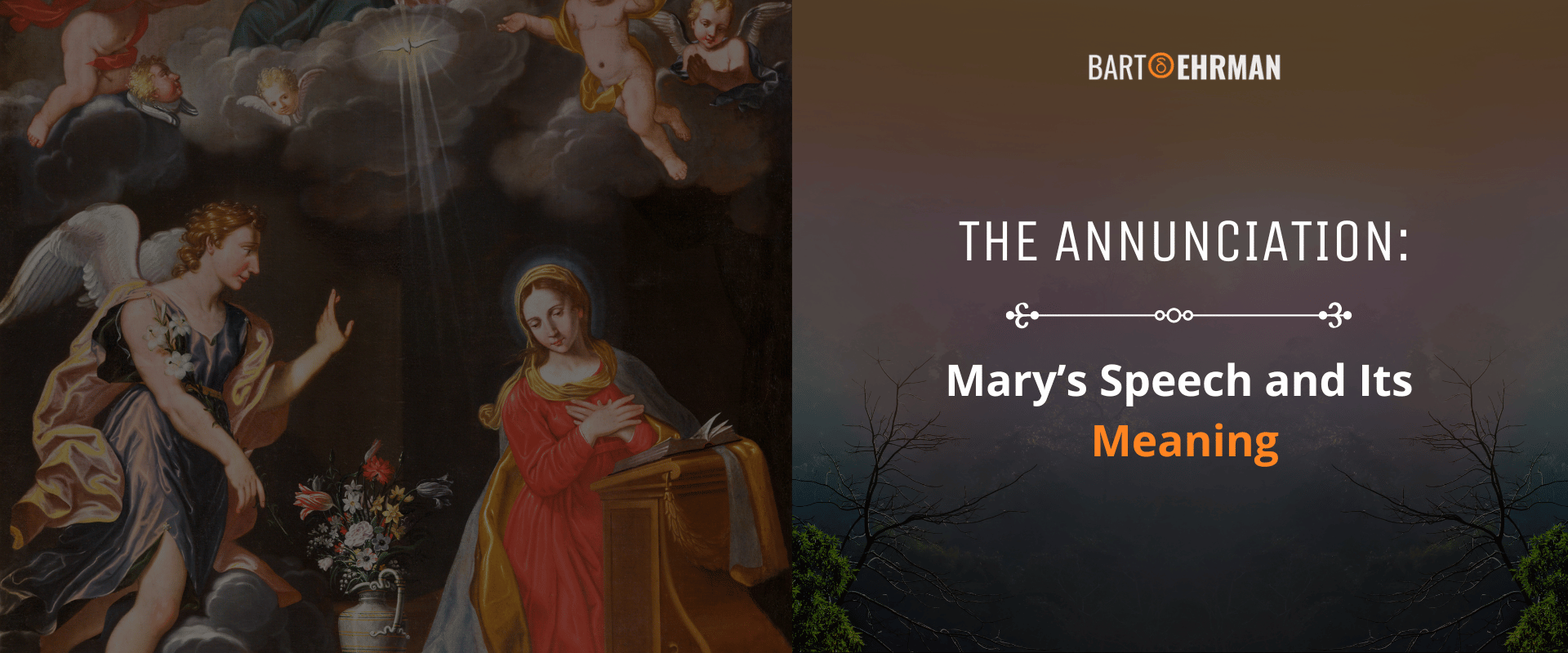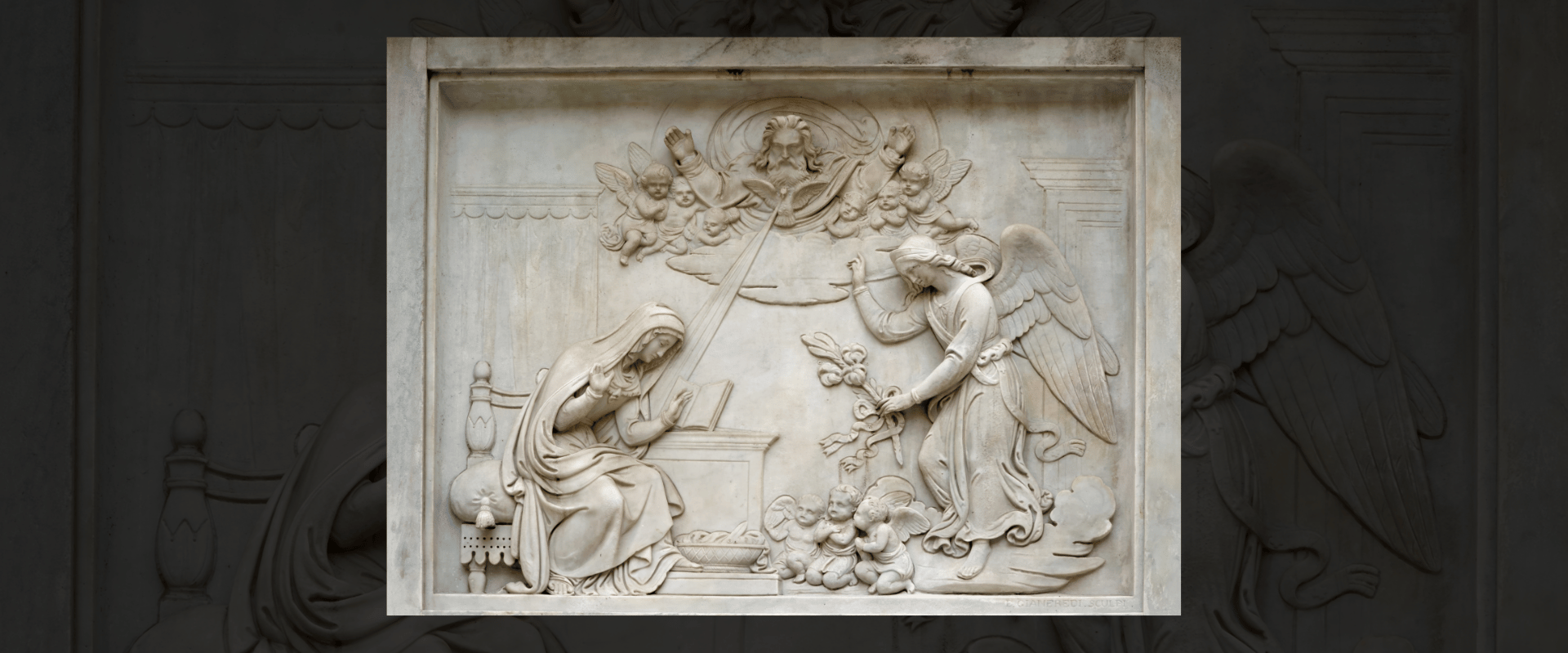The Annunciation: Mary’s Speech and Its Meaning

Written by Joshua Schachterle, Ph.D
Author | Professor | Scholar
Author | Professor | BE Contributor
Verified! See our editorial guidelines
Verified! See our guidelines
Edited by Laura Robinson, Ph.D.
Date written: September 24th, 2024
Disclaimer: The views and opinions expressed in this article belong to the author and do not necessarily match my own. - Dr. Bart D. Ehrman
The Annunciation is a pivotal event in Christian tradition, heralding the miraculous angelic declaration of the impending birth of Jesus. This announcement not only established the foundation for the Christian belief in the divine nature of Jesus but also set the stage for subsequent events in the New Testament.
This narrative event and its aftermath underscore the profound theological and social implications of Jesus’ birth, making the Annunciation a cornerstone of Christian reflection and celebration. In this article, I’ll tell you about the Annunciation’s meaning, why it matters, where to find it in the Bible and the name of the angel associated with it.

What Is the Annunciation? An Angel Visits Mary
The Annunciation, also called Annunciation to the Blessed Virgin Mary, the Annunciation of Our Lady, or the Annunciation of the Lord, refers to the announcement to Mary by an angel named Gabriel that she will give birth to Jesus. The Annunciation meaning comes from the Latin word annuntiatio, for “announcement,” “declaration,” or “message.” It is often thought of as part 1 of the story, with Mary’s song of praise, the Magnificat, as part 2.
What did Gabriel say to Mary? The principal version of this story and the conversation between them is in Luke 1:26-38:
In the sixth month the angel Gabriel was sent by God to a town in Galilee called Nazareth, to a virgin engaged to a man whose name was Joseph, of the house of David. The virgin’s name was Mary. And he came to her and said, “Greetings, favored one! The Lord is with you.” But she was much perplexed by his words and pondered what sort of greeting this might be. The angel said to her, “Do not be afraid, Mary, for you have found favor with God. And now, you will conceive in your womb and bear a son, and you will name him Jesus. He will be great and will be called the Son of the Most High, and the Lord God will give to him the throne of his ancestor David. He will reign over the house of Jacob forever, and of his kingdom there will be no end.” Mary said to the angel, “How can this be, since I am a virgin?” The angel said to her, “The Holy Spirit will come upon you, and the power of the Most High will overshadow you; therefore the child to be born will be holy; he will be called Son of God. And now, your relative Elizabeth in her old age has also conceived a son, and this is the sixth month for her who was said to be barren. For nothing will be impossible with God.” Then Mary said, “Here am I, the servant of the Lord; let it be with me according to your word.” Then the angel departed from her.
Notice this interesting detail in the conversation between Gabriel and Mary: his greeting to her, from the King James Version, is the basis of one of the most common Catholic prayers, the Hail Mary. It begins with “Hail Mary, the Lord is with thee. Blessed art thou among women and blessed is the fruit of thy womb, Jesus.” In fact, part of the historical significance of this passage in Luke is its eventual contribution to Marian devotion in the Church, adding to the Annunciation’s meaning.
Other versions of the announcement of Jesus’ birth exist as well, each differing from the others in some ways. In Matthew 1:20-21, for example, the announcement comes to Joseph instead of Mary, who has become pregnant despite her virginity. Joseph plans to quietly divorce Mary in order not to shame her. But according to Matthew, just when he had resolved to do this, an angel of the Lord appeared to him in a dream and said,
Joseph, son of David, do not be afraid to take Mary as your wife, for the child conceived in her is from the Holy Spirit. She will bear a son, and you are to name him Jesus, for he will save his people from their sins.
Since Matthew and Luke are the only canonical Gospels that contain stories of Jesus’ birth, these are the only two places in the Bible that mention the Annunciation. However, there are versions outside the biblical canon, too.
For example, a gospel called the Protoevangelium of James, written around the middle of the 2nd century CE and not included in the biblical canon, says that the annunciation happened at a well where Mary was getting water. The Annunciation comes after a longer biography of Mary which contributed further to Church doctrine about her virginity and sinlessness. Note also that this version shares a lot with Luke’s version:
And behold, an angel of the Lord stood before her, saying: “Fear not, Mary; for you have found grace before the Lord of all, and you shall conceive, according to His word.” And she hearing, reasoned with herself, saying: Shall I conceive by the Lord, the living God? And shall I bring forth as every woman brings forth? And the angel of the Lord said: “Not so, Mary; for the power of the Lord shall overshadow you: wherefore also that holy thing which shall be born of you shall be called the Son of the Most High. And you shall call His name Jesus, for He shall save His people from their sins.” And Mary said: “Behold, the servant of the Lord before His face: let it be unto me according to your word.”
Finally, we have a version of the Annunciation in the Quran, specifically in a chapter about Mary, the Surah Maryam 19:16–26:
And mention in the Book ˹O Prophet, the story of˺ Mary when she withdrew from her family to a place in the east, screening herself off from them. Then We sent to her Our angel, ˹Gabriel,˺ appearing before her as a man, perfectly formed. She appealed, “I truly seek refuge in the Most Compassionate from you! ˹So leave me alone˺ if you are God-fearing.” He responded, “I am only a messenger from your Lord, ˹sent˺ to bless you with a pure son.” She wondered, “How can I have a son when no man has ever touched me, nor am I unchaste?” He replied, “So will it be! Your Lord says, ‘It is easy for Me. And so will We make him a sign for humanity and a mercy from Us.’ It is a matter ˹already˺ decreed.” So she conceived him and withdrew with him to a remote place.
Note that in this version, despite God granting Mary a son, Jesus is never said to be divine. Muslims consider Jesus a great human prophet but not divine. On the other hand, notice how many of the elements from Luke’s version are also present in the Quranic story.
FREE COURSE!
WHY I AM NOT A CHRISTIAN
Raw, honest, and enlightening. Bart's story of why he deconverted from the Christian faith.
Over 6,000 enrolled!
Analysis and Comparison of Luke’s and Matthew’s Annunciations
Let’s take a closer look at the two canonical versions of the Annunciation and see what we can learn from them. I’ll compare the two to assess the Annunciation’s meaning in both.
Luke’s story begins after the miraculous conception of John the Baptist by Zacharias and Elizabeth, who had been unable to bear a child. In Luke, Elizabeth is said to be a relative of Mary’s, although this information isn’t given anywhere else. The “sixth month” at the beginning of the Annunciation story refers to Elizabeth’s sixth month of pregnancy.
One detail to note is that Luke assumes Mary and Joseph were originally from Nazareth. Matthew, on the other hand, says they lived in Bethlehem and only ended up in Nazareth later, after fleeing from Herod and then learning that Herod’s son had become king of Judea.
While both Matthew and Luke say that Mary was a virgin when she conceived, they seem to have different understandings of the importance of this detail. In A Brief Introduction to the New Testament, Bart Ehrman notes that in Matthew, the virginal conception is the fulfillment of a prophecy from Isaiah 7:14, which he quotes as “a virgin shall conceive and bear a son.” (Affiliate Disclaimer: We may earn commissions on products you purchase through this page at no additional cost to you. Thank you for supporting our site!)
Luke, on the other hand, doesn’t mention this prophecy at all and thus gives a different significance to the virginal conception, one that emphasizes Jesus’ divine nature. Ehrman notes that since most scholars consider Luke’s audience to be a community of Gentile Christians, it’s possible that Luke “presents the story of Jesus’ birth in a way that would make sense to a pagan reader who was conversant with tales of other divine beings… who were born of the union of a mortal with a god.”
While there are many examples of this from Greco-Roman mythology, in The Historical Jesus: A Guide for the Perplexed, Helen Bond points out that there were similar stories about the conceptions of well-known rulers in the ancient world. In his book The Twelve Caesars, for example, ancient Roman historian Suetonius says Caesar Augustus was conceived in the Temple of Apollo. His mother Atia was said to have been asleep when a serpent crawled into the litter where she was sleeping and then crawled out. Suetonius says that since Augustus was born nine months later, he must have been the son of Apollo.
Speaking of rulers, Luke’s version includes some royal imagery: “He will be great and will be called the Son of the Most High, and the Lord God will give to him the throne of his ancestor David. He will reign over the house of Jacob forever, and of his kingdom there will be no end.”
In the The Harper-Collins Study Bible, Christopher Matthews points out that this is a reference to the fulfillment of a prophecy in 2 Samuel 7:16 in which the prophet Nathan tells King David “Your house and your kingdom shall be made sure forever before me; your throne shall be established forever.” This kingly element is further enhanced by the fact that it is announced to Mary by Gabriel, often shown as God’s chief messenger (see, for example, Daniel 8:15–26, 9:21–27). Matthew’s Annunciation lacks this royal aspect.
Luke emphasizes Jesus as a descendant of David as well. This is certainly significant to Luke, since, as Amy-Jill Levine notes in the Jewish Annotated New Testament, one dominant Messianic expectation was that the Messiah would be David’s descendent. Matthew’s Annunciation calls Joseph “son of David,” further emphasizing Jesus’ messianic lineage.
A final interesting element that has resonated with Christians for centuries is Mary’s response to the angel:
Then Mary said, “Here am I, the servant of the Lord; let it be with me according to your word.”
While Gabriel never asks Mary if she wants to play this role in bearing the Messiah, her willingness to go along with God’s plan has traditionally been viewed as significant. As Jennifer Powell McNutt and Amy Beverage Peeler write, many think of Mary as the first Christian since she “was the first to receive the Good News of Christ’s coming and to assent to it.” This assent to God’s will is mirrored by Jesus in the Garden of Gethsemane in Luke 22:42 when, although he asks God not to make him suffer on the cross, he says “yet not My will, but Yours be done.”

The Magnificat: Mary’s Annunciation Speech
After the Annunciation, Mary visits Elizabeth. After Elizabeth blesses her, Mary breaks into a song of praise later called the Magnificat, a Latin word meaning “magnify” or “praise,” This happens in Luke 1:46-55:
Then Mary said:
“My soul exalts the Lord,
And my spirit has rejoiced in God my Savior.
For He has had regard for the humble state of His bond-servant;
For behold, from now on all generations will call me blessed.
For the Mighty One has done great things for me;
And holy is His name.
And His mercy is to generation after generation
Toward those who fear Him.
He has done mighty deeds with His arm;
He has scattered those who were proud in the thoughts of their hearts.
He has brought down rulers from their thrones,
And has exalted those who were humble.
He has filled the hungry with good things,
And sent the rich away empty-handed.
He has given help to His servant Israel,
In remembrance of His mercy,
Just as He spoke to our fathers,
To Abraham and his descendants forever.”
In the Jewish Annotated New Testament, Amy-Jill Levine notes that this canticle is based on the song of Hannah from 1 Samuel 2:1-10. Hannah, like Mary, is able to conceive a son with God’s help.
Beyond merely giving thanks to God for his plan and her place in it, Mary’s song emphasizes God’s care for the poor and disdain for the rich, saying, for instance, that “He has filled the hungry with good things, and sent the rich away empty-handed.” This is a foreshadowing of Luke’s Jesus, who, with quotes such as “Blessed are the poor” and numerous injunctions to give away wealth, will emphasize that caring for the poor is God’s will.
Conclusion
If you’ve ever wondered why such a small New Testament passage merited its own grand title — the Annunciation — perhaps now you understand. Luke’s version of the visitation from the angel Gabriel signaled that God’s plan to redeem the world was under way, and the vehicle through whom that plan would be made possible had been chosen. In addition, this passage has been used for centuries as part of the Hail Mary prayer and Marian devotion in general.
While there are different versions of the Annunciation — Luke, Matthew, the Protoevangelium of James, the Quran — the best known and most quotable one is from Luke. In Luke, all the pieces of God’s plan for salvation through Jesus are revealed. Mary, a virgin, will bear the literal son of God, an idea that may have been calculated to appeal to pagans who had converted to Christianity and were familiar with the idea of a child resulting from a union between a god and a human being.
The message to Mary in Luke, coming from God’s chief messenger Gabriel, includes that Jesus will fulfill the ancient prophecy made to David that his kingdom would never end. This is why Gabriel says Jesus will be “great and the Son of the Most High” and will thus be worthy of David’s throne.
Mary, while visiting her relative Elizabeth, then breaks into a song of praise and thanksgiving called the Magnificat which, as part 2 of the Annunciation story, introduces God’s concern for the poor as a major theme of Jesus’ ministry.

